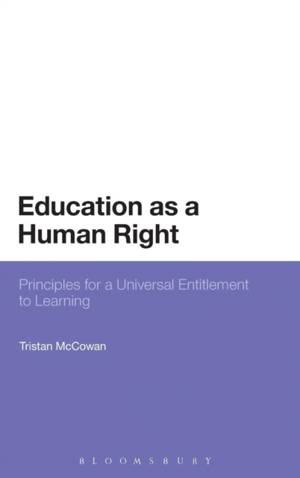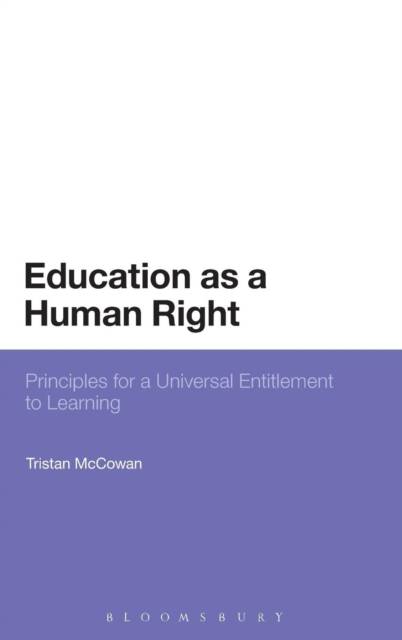
Bedankt voor het vertrouwen het afgelopen jaar! Om jou te bedanken bieden we GRATIS verzending (in België) aan op alles gedurende de hele maand januari.
- Afhalen na 1 uur in een winkel met voorraad
- In januari gratis thuislevering in België
- Ruim aanbod met 7 miljoen producten
Bedankt voor het vertrouwen het afgelopen jaar! Om jou te bedanken bieden we GRATIS verzending (in België) aan op alles gedurende de hele maand januari.
- Afhalen na 1 uur in een winkel met voorraad
- In januari gratis thuislevering in België
- Ruim aanbod met 7 miljoen producten
Zoeken
Education as a Human Right
Principles for a Universal Entitlement to Learning
Tristan McCowan
Hardcover | Engels
€ 339,45
+ 678 punten
Uitvoering
Omschrijving
Education is widely recognized as a fundamental human right, yet the nature of the right remains unclear. Is it an entitlement to go to school, to acquire particular forms of knowledge or develop particular skills or attributes? And why exactly is education so important that we might defend all people's right to it? This book provides a much-needed exploration of this key contemporary issue. Highlighting limitations in the approaches of both the Education for All initiative and existing international law, the book presents a radical new vision of how the right can be understood. As well as basic education, there are discussions of higher and lifelong education, of human rights education, and of the intersection of rights-based approaches with others such Amartya Sen's 'capabilities'. The work serves as a stirring defense of the universal right to education against instrumental conceptions of learning, the inactivity of national governments and the abrogation of responsibility of the international community.
Specificaties
Betrokkenen
- Auteur(s):
- Uitgeverij:
Inhoud
- Aantal bladzijden:
- 224
- Taal:
- Engels
Eigenschappen
- Productcode (EAN):
- 9781441122773
- Verschijningsdatum:
- 27/06/2013
- Uitvoering:
- Hardcover
- Formaat:
- Genaaid
- Afmetingen:
- 155 mm x 236 mm
- Gewicht:
- 453 g

Alleen bij Standaard Boekhandel
+ 678 punten op je klantenkaart van Standaard Boekhandel
Beoordelingen
We publiceren alleen reviews die voldoen aan de voorwaarden voor reviews. Bekijk onze voorwaarden voor reviews.









